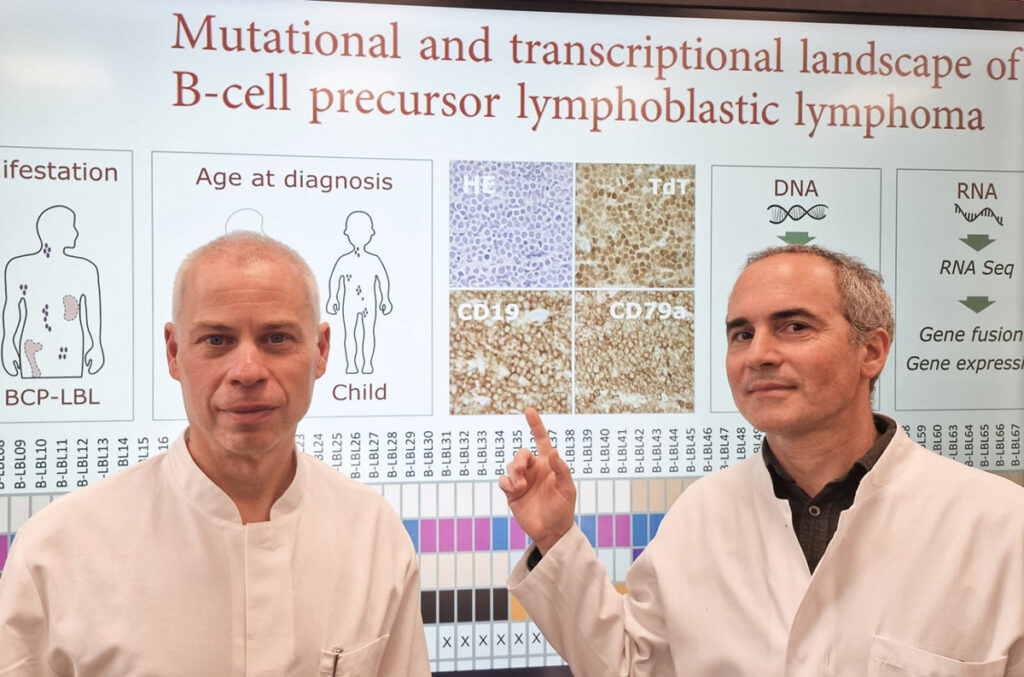Defining subtypes in pediatric B-cell precursor lymphoblastic lymphoma
B-cell precursor lymphoblastic lymphoma (BCP-LBL) is a rare and aggressive form of childhood cancer, and is closely related to the more common BCP acute lymphoblastic leukemia (BCP-ALL). In a new study, researchers from the University Clinic of Schleswig Holstein, Campus Kiel, and the Princess Máxima Center for Pediatric Oncology, Utrecht, have achieved a milestone in better understanding BCP-LBL and its relevant subtypes by analyzing the largest cohort of this rare disease described to date, comprising up to 97 cases. Their findings have been recently published in the journal Blood.

While BCP-LBL and BCP-ALL share similarities in morphology and immune response, molecular studies have primarily focused on BCP-ALL due to the rarity of BCP-LBL and the challenges associated with analyzing small, formalin-fixed paraffin-embedded (FFPE) tissue samples. “In our study, we used whole-exome sequencing to uncover the mutational landscape in BCP-LBL and found that it closely mirrors that of BCP-ALL,” explained Dr. Ingram Iaccarino, shared first author of the study. However, the researchers also observed distinct differences, where epigenetic modifiers showed a higher frequency of mutations in BCP-LBL than genes involved in B-cell development, which are more prevalent in BCP-ALL.
Using the recently published ALLCatchR classifier and integrating data on copy number alterations, somatic mutations, and gene expression through RNA-sequencing, the researchers identified the same molecular subtypes within BCP-LBL as observed in BCP-ALL. They found that nearly all molecular subtypes identified in BCP-ALL were also present in BCP-LBL, underscoring the molecular heterogeneity of this disease. High hyperdiploidy and ETV6::RUNX1 are the most frequent subtypes of BCP-LBL as in BCP-ALL, with tyrosine kinase/cytokine-receptor rearrangements detected in a small subset of cases. “By identifying the molecular subtypes and genetic alterations in pediatric BCP-LBL, we hope to be able to tailor treatment strategies, thereby improving patient outcomes in this rare disease,” says Professor Wolfram Klapper, co-corresponding author of the study.
About CATCH ALL
This study is the latest result of the clinical research group “CATCH ALL – Towards a Cure for Adults and Children with Acute Lymphoblastic Leukemia (ALL)”, which is funded with around five million euros from the German Research Foundation (DFG) since January 2022. By close collaboration between researchers and clinicians, CATCH ALL aims to translate promising therapy approaches into clinical practice to enhance treatment outcomes across all age groups and for all patients. Professor Claudia Baldus, spokesperson for CATCH ALL, highlights the significance of this new study: “Identifying the molecular subtypes of pediatric B-cell precursor lymphoblastic lymphoma is a crucial step toward personalized medicine and improved patient outcomes.”
Text: Dr. Claudia Taubenheim
Original publication:
Kroeze E, Iaccarino I, Kleisman MM, Mondal M, Beder T, Khouja M, Höppner MP, Scheijde-Vermeulen MA, Kester LA, Brüggemann M, Baldus CD, Cario G, Bladergroen RS, Garnier N, Attarbaschi A, Verdu-Amorós J, Sutton R, Macintyre EA, Scholten K, Padilla LA, Burkhardt B, Beishuizen A, Boer M L, Kuiper RP, Loeffen JLC, Boer JM, Klapper W. Mutational and transcriptional landscape of pediatric B-cell precursor lymphoblastic lymphoma. Blood 2024; blood.2024023938. doi: https://doi.org/10.1182/blood.2024023938
You can find a German press release here.


